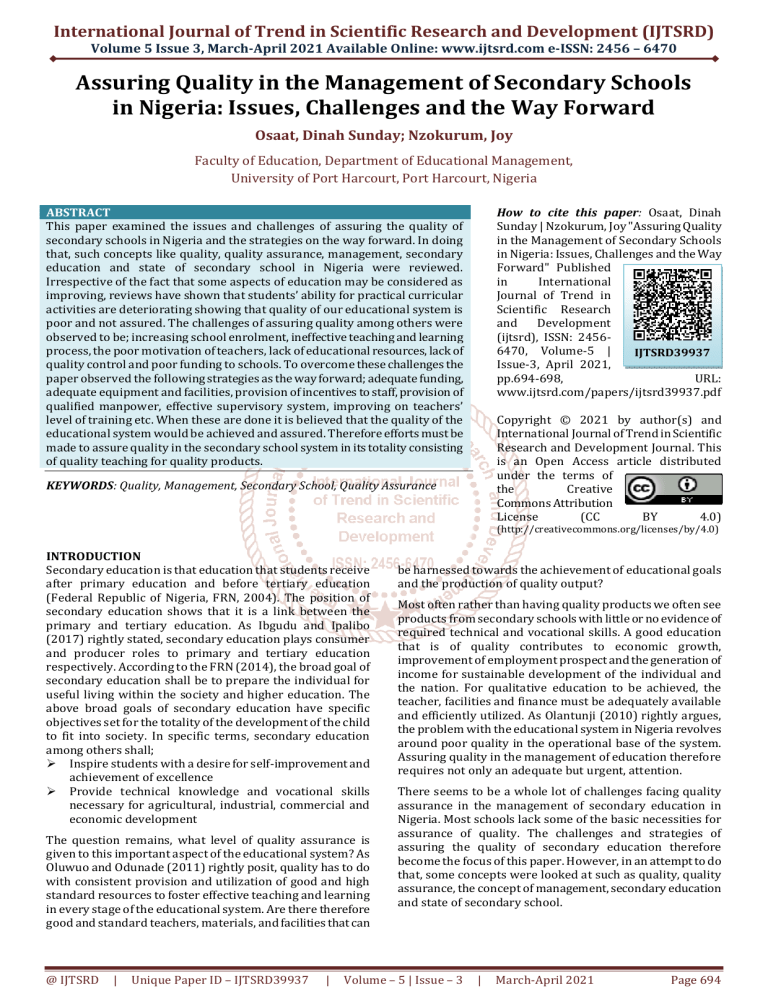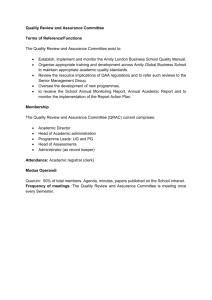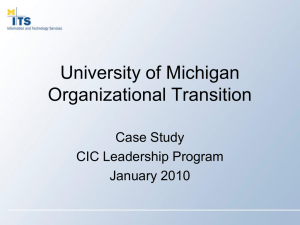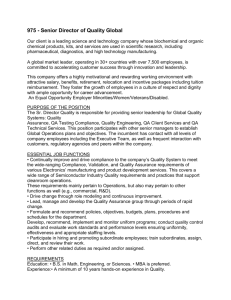
International Journal of Trend in Scientific Research and Development (IJTSRD)
Volume 5 Issue 3, March-April 2021 Available Online: www.ijtsrd.com e-ISSN: 2456 – 6470
Assuring Quality in the Management of Secondary Schools
in Nigeria: Issues, Challenges and the Way Forward
Osaat, Dinah Sunday; Nzokurum, Joy
Faculty of Education, Department of Educational Management,
University of Port Harcourt, Port Harcourt, Nigeria
ABSTRACT
This paper examined the issues and challenges of assuring the quality of
secondary schools in Nigeria and the strategies on the way forward. In doing
that, such concepts like quality, quality assurance, management, secondary
education and state of secondary school in Nigeria were reviewed.
Irrespective of the fact that some aspects of education may be considered as
improving, reviews have shown that students’ ability for practical curricular
activities are deteriorating showing that quality of our educational system is
poor and not assured. The challenges of assuring quality among others were
observed to be; increasing school enrolment, ineffective teaching and learning
process, the poor motivation of teachers, lack of educational resources, lack of
quality control and poor funding to schools. To overcome these challenges the
paper observed the following strategies as the way forward; adequate funding,
adequate equipment and facilities, provision of incentives to staff, provision of
qualified manpower, effective supervisory system, improving on teachers’
level of training etc. When these are done it is believed that the quality of the
educational system would be achieved and assured. Therefore efforts must be
made to assure quality in the secondary school system in its totality consisting
of quality teaching for quality products.
How to cite this paper: Osaat, Dinah
Sunday | Nzokurum, Joy "Assuring Quality
in the Management of Secondary Schools
in Nigeria: Issues, Challenges and the Way
Forward" Published
in
International
Journal of Trend in
Scientific Research
and
Development
(ijtsrd), ISSN: 24566470, Volume-5 |
IJTSRD39937
Issue-3, April 2021,
pp.694-698,
URL:
www.ijtsrd.com/papers/ijtsrd39937.pdf
Copyright © 2021 by author(s) and
International Journal of Trend in Scientific
Research and Development Journal. This
is an Open Access article distributed
under the terms of
the
Creative
Commons Attribution
License
(CC
BY
4.0)
KEYWORDS: Quality, Management, Secondary School, Quality Assurance
(http://creativecommons.org/licenses/by/4.0)
INTRODUCTION
Secondary education is that education that students receive
after primary education and before tertiary education
(Federal Republic of Nigeria, FRN, 2004). The position of
secondary education shows that it is a link between the
primary and tertiary education. As Ibgudu and Ipalibo
(2017) rightly stated, secondary education plays consumer
and producer roles to primary and tertiary education
respectively. According to the FRN (2014), the broad goal of
secondary education shall be to prepare the individual for
useful living within the society and higher education. The
above broad goals of secondary education have specific
objectives set for the totality of the development of the child
to fit into society. In specific terms, secondary education
among others shall;
Inspire students with a desire for self-improvement and
achievement of excellence
Provide technical knowledge and vocational skills
necessary for agricultural, industrial, commercial and
economic development
The question remains, what level of quality assurance is
given to this important aspect of the educational system? As
Oluwuo and Odunade (2011) rightly posit, quality has to do
with consistent provision and utilization of good and high
standard resources to foster effective teaching and learning
in every stage of the educational system. Are there therefore
good and standard teachers, materials, and facilities that can
@ IJTSRD
|
Unique Paper ID – IJTSRD39937
|
be harnessed towards the achievement of educational goals
and the production of quality output?
Most often rather than having quality products we often see
products from secondary schools with little or no evidence of
required technical and vocational skills. A good education
that is of quality contributes to economic growth,
improvement of employment prospect and the generation of
income for sustainable development of the individual and
the nation. For qualitative education to be achieved, the
teacher, facilities and finance must be adequately available
and efficiently utilized. As Olantunji (2010) rightly argues,
the problem with the educational system in Nigeria revolves
around poor quality in the operational base of the system.
Assuring quality in the management of education therefore
requires not only an adequate but urgent, attention.
There seems to be a whole lot of challenges facing quality
assurance in the management of secondary education in
Nigeria. Most schools lack some of the basic necessities for
assurance of quality. The challenges and strategies of
assuring the quality of secondary education therefore
become the focus of this paper. However, in an attempt to do
that, some concepts were looked at such as quality, quality
assurance, the concept of management, secondary education
and state of secondary school.
Volume – 5 | Issue – 3
|
March-April 2021
Page 694
International Journal of Trend in Scientific Research and Development (IJTSRD) @ www.ijtsrd.com eISSN: 2456-6470
Concept of Quality
In any organisation, quality is something that cannot be
toiled with. Quality is concerned with measuring up and
ensuring conformity to a predetermined specification.
Quality has been variously described as a measure for
excellence, quality as perfection, quality as value for money,
quality as customer satisfaction, quality as fitness for
purpose and quality as transformation. Quality is the ability
or degree with which a product, service, or phenomenon
conforms to an established standard and which make it to be
relatively superior to others (Osaat, 2013). With respect to
education, quality implies the ability or degree to which an
educational system conforms to the established standard
and appropriateness of the inputs available for the delivery
of the system. Arikenuyo (2004) posits that quality in
education is to be judged by both its ability to enable the
students to perform well in standard examination and
relevance to the needs of the students. Quality in education
is associated with the monitoring and evaluation component
of the school system to see whether the outcome is good and
of the intended standard. Quality in education is that that
impacts the citizenry and the relevance of that education to
the life of the individual in particular and the nation in
general.
Concept of Quality Assurance
Two major things are important when talking about quality.
Quality is controlled and assured. Quality control involves
weeding out parts that are below standard. It dictates
deviation from the set standard. On the other hand, quality
assurance is a before event process that involves preventing
faults or deviation from occurring in the first place
(Okorie&Uche, 2004). Quality assurance refers to the
processes and procedures that monitor different aspects of a
service, detect, correct and ensure that quality standards are
being kept.
Obioma (2012) defines quality assurance as an allencompassing concept which includes all inputs, process and
actions through which the quality of education is developed,
improved and maintained. It is the planned and systematic
activities implemented in a system so that excellence
requirements for a product can be fulfilled. Quality
assurance describes all the planned and systematic actions
necessary to assure that a product or service will satisfy the
specified requirement.
Tama (2006) refers to quality assurance as the processes
which provide a systematic and efficient method for
gathering, analysing and maintaining information on the
quality characteristics of products, the source and nature of
defects, and their immediate impact on the current
operation. Ajayi and Akinduture (2007) posit that quality
assurance is about consistently meeting product
specifications or getting things done the first time and every
time. From the ongoing one can deduce that quality
assurance in education is the processes of monitoring,
assessing and evaluating all aspects of the education
activities with a view of improving the products of the
education system. In fact, quality assurance is a management
tool which aims at improving the quality of the educational
system ranging from the input, process and outputs being
the products. Babalola (2011) sees quality assurance in
education as the controlling and raising the quality of
education above a certain level, thus ensuring that minimum
standards of education are achieved or exceeded as
envisaged by various stakeholders. Quality assurance is a
@ IJTSRD
|
Unique Paper ID – IJTSRD39937
|
holistic method of identifying and resolving the problem
within the educational system in order to ensure continuous
quality improvement.
Nwagwu, (2003) lists some fundamental indices of quality
assurance in education. These include;
Quality of school leavers
Class size and teacher-student ratio.
Availability of qualified teachers
Discipline and character formation.
Time utilization and management
Recreational facilities
School curriculum, teaching and learning facilities
Others are;
Availability of conducive classroom for learning
Availability of well-equipped laboratory etc.
Needs and focus on quality assurance in the educational
system
Different authors have looked at the needs of quality
assurance in different perspectives depending on the
individual interest. Ehindew (2004) posits that quality
assurance focuses on;
Learners entry behaviour characteristics and attributes
including some demographic factors that can inhibit or
facilitate their learning
The teacher entry qualification, values, pedagogic skills,
professional preparedness, subject background,
philosophic orientation
The teaching-learning process including the structure of
the curriculum and learning environment.
The National Educational Assurance Policy in Nigeria
specifies 8 components of quality assurance standard which
are;
Learner achievement and standard
Learners welfare and participation
Care guidance and support
Leadership and support
School community relationship
Learning environment
Teaching and Learning and
Curriculum.
Munachi (2006) stated that the major needs of quality
assurance in the educational system in Nigeria are;
Ensuring and maintaining a high standard of education
at all levels
Assisting in monitoring and supervising education
Determining the quality of teacher input
Determining the number of classrooms needed based on
the average class size.
Determining the level of adequacy of the facilities
available
Ensuring prudent and judicious utilization of financial
resources available
From the above, it can be deduced that quality assurance
focuses on the totality of all the activities that are conducted
to achieve or maintain a certain acceptable quality level. It is
a management strategy aimed at ensuring the totality of the
combination of some indispensable variables such as quality
teachers, instructional materials, infrastructures, favourable
teacher-pupil ratio, pupils’ classroom, instructional
supervision etc. No wonder FME (2010) sees quality
assurance as being focused on the monitoring, assessing,
evaluating as well as objectively as possible all aspects of
school life including its setting, what is provided, resource
Volume – 5 | Issue – 3
|
March-April 2021
Page 695
International Journal of Trend in Scientific Research and Development (IJTSRD) @ www.ijtsrd.com eISSN: 2456-6470
utilization as well as communicating the outcomes to all
concerned for consistent improvement.
Importance of assuring the quality of the secondary
educational system
Quality assurance involves all the processes that contribute
to the success of the end-products of the school quality
which serves as determinants of graduation based on the
standard of excellence. The importance therefore cannot be
overemphasised. As Okwuosa (2007) rightly posits, the
major importance of quality is to ensure the internalization
of effectiveness and efficiency of which without the
educational system become meaningful and non-proactive.
Multon (2008) opines that quality assurance encourages the
employment of teachers based on merit as it is a
demonstration of professional knowledge and skills during
the recruitment test process. Olantunji (2010) also posits
that through the effective use of quality assurance strategy,
sound and employable school graduates will be produced.
Another great importance of quality assurance as posited by
Ikwuelo (2004) is that it creates room for improvement and
modification. This could be through professional
development programmes, mentoring, supervision which
could improve the capacity of teachers and impact positively
on their knowledge and skills.
The concept of management
The concept of management could mean different things
depending on the context of usage. Management can be seen
as planning and organising human and material resources in
a way that ensures effectiveness and efficiency in an
organisation. In this paper, management is directed at the
achievement of organisational goals most advantageously in
terms of the use of organisational resources. Management
here therefore is a task that has to be performed. However,
as a task, somebody must direct the activities of others so
that the task is carried out. Based on that management as
rightly posit by Akinwumiju&Agabi (2013) can be seen as
the body of personnel at the policymaking level in an
organisation. In the educational establishment for example it
is the position occupied by the Ministers of Education, school
heads, subject heads etc. who direct and control activities of
other members towards the achievement of educational
goals. Asodike in Iluene (2017) defines management as the
skills the manager or leaders adopts to utilise human and
material resources to achieve predetermined organisational
goals. One of the management skills is that of assuring
quality in the sense of assuring that, qualities of these
resources that are coordinated to achieve a definite goal are
not undermined.
The State of Secondary school management and quality
assurance
The responsibility of managing education in Nigeria is
shared between the three tiers of government, the federal,
state and local governments. Statutory bodies are
established by the government for the management of
schools in the country. These are Federal Ministry of
Education (FME), State Ministry of Education, Local
Government Education Authorities (LEAs), Universal Basic
Education Commission (UBEC), State Universal Basic
Education Boards (SUPEBs). While the Federal Ministry
through its agencies manages some federal secondary
schools, the state ministries of education through its
agencies manage state secondary schools. A close look at the
@ IJTSRD
|
Unique Paper ID – IJTSRD39937
|
functions of these educational agencies as stipulated in FRN
(2014) shows common things among them which are;
1. Prescription of minimum standards as well as setting
and maintaining uniform standards of education in the
country
2. Provision of broad educational services in Nigeria
3. Establishment and maintenance of an efficient
inspectorate service for monitoring and maintaining
standards at all levels of education below tertiary levels.
4. Organisation of supervision and inspection of all
educational institutions
5. Development and dissemination of curricula and
instructional materials
6. Capacity building for teachers
7. Financing of Education etc.
The issue, therefore, is the level of commitment on the parts
of these agencies to ensure that all these functions are
carried out to achieve the quality of our secondary education
in the country. There have always been debates on whether
the quality of education is rising or falling. In Nigeria
experience, for instance, Babalola (2011) posits that
irrespective of the fact that some aspects of education may
be considered as improving, nevertheless, students’ ability
for practical curricular activities may be said to be
deteriorating as facilities for such courses as woodwork,
metalwork etc. are in more bad shape and less generally
available now than before. This implies that quality
management of our secondary education in Nigeria to a high
extent is not assured. What then are the challenges?
Challenges facing Quality Assurance in Nigerian
Secondary schools
Major strides have been made in introducing quality
assurance department in our schools, the reason being to
improve the quality of teaching and learning in schools.
However, a good level of quality has not been achieved.
Assuring Quality in Nigerian secondary schools is being
faced with a whole lot of challenges. The following are some
of them;
Increasing school enrolment:
The issue of increasing enrolment cannot be counted out in
the issue of assuring quality in secondary education. Most
often the available resources are not commensurate with the
available students. In most cases, there are always
overcrowded classrooms which cannot give room to achieve
the quality of teaching and learning
Financial problems:
Financial problem is another serious factor militating against
quality assurance in the management of secondary
education. Infact, according to Babalola (2011), there is a
critical shortage of financial resources for the inspectorate
and the inspectors specifically.
Poor motivation of teachers:
The poor motivation of teachers to cater to the teeming
population of students is another challenge facing quality
assurance in secondary schools. Salaries of teachers have
always remained stagnant without increment, promotion
and implementation of the promotion. This is evident in
some of the states in Nigeria. Rivers state in Nigeria for
instance has not been able to give increment to their
teachers since 2013 till the time of writing this paper. In the
presence of all these, teachers resort to embarking on strike
actions as a way of forcing the hands of government for
better packages.
Volume – 5 | Issue – 3
|
March-April 2021
Page 696
International Journal of Trend in Scientific Research and Development (IJTSRD) @ www.ijtsrd.com eISSN: 2456-6470
Lack of quality control:
Quality control is one of the strategies to achieve quality
assurance. According to Oluwuo and Odunlade(2011) quality
has to do with school’s inspection, monitoring and control.
Enough is not achieved in this area. Most often funds are not
made available for an effective supervisory system well
funded to monitor the activities of both the teachers and the
students to assure quality in the system. There are poor
supervision practices in the system. This cannot enhance
quality assurance.
Lack of educational resources:
Educational resources are facilities are material resources
which enhance effective teaching and learning. These include
buildings, structures, equipment, textbooks, furniture,
recreational facilities etc. They constitute vital inputs which
are capable of achieving good results. Most often these
facilities are lacking and many at times not adequately
provided. As Fasasi (2006) rightly says that the effect of this
poor supply of facilities is shown on the poor conducive
atmosphere for knowledge and skill acquisition.
Ineffective teaching and learning process:
In the absence of adequate provision of resources such as
textbooks in schools, the resultant effect is poor teaching and
learning. In the face of this, quality cannot be assured.
Others include according to Sofoware (2010) are;
Administrative issues
Political instability
Negative attitudes
Wastages
High level of corruption in the system
Insincerity in the implementation of tasks etc.
Strategies for achieving quality assurance in Nigerian
schools
To achieve quality assurance in Nigerian secondary schools
the following can be done;
Adequate funding:
Adequate fiscal allocation should be provided by the
government in line with the 26 percentage recommended by
UNESCO to provide needed resource materials. If this is done
necessary materials that will lead to quality teaching and
learning will be provided.
Adequate equipment and facilities:
Adequate provision of equipment and facilities should be
provided to enhance quality assurance in secondary schools
Provision of qualified manpower:
If quality is to be assured in secondary schools then the
government should make provision of qualified manpower
(teachers) in quality and quantity to meet up with the
number of subjects taught in secondary schools. When these
qualified teachers are provided and encouraged to adopt and
improve on new method and techniques in classroom
teaching and learning, then quality can be assured in the
system.
Improving teachers' level of training:
Teachers should be given the opportunity to improve on
their level of training. When this is done they would be
exposed to modern trends of their profession as it would
help in assuring quality.
Provision of staff incentives:
School managers should provide incentives to workers
especially the teachers. When this is done it will lead to
@ IJTSRD
|
Unique Paper ID – IJTSRD39937
|
encouraging and rewarding quality work performance by
staff.
Effective supervisory system:
There should be an effective supervisory system well funded
to monitor the activities of both the teachers and the
students to assure quality in the system.
Elimination of corrupt practice:
The management of various secondary schools should
increase their efforts at assuring quality through the
elimination of corrupt practices and the creation of ideas for
innovative practices that will increase quality assurance in
their schools.
Conclusions
Secondary education is the education children receive after
primary education and before tertiary education. It is that
education which is aimed at preparing the individual for
useful living and higher education. At the end of secondary
school, the student is expected to excel in some talents,
opportunities, acquire some technical knowledge and
vocational skills necessary for agricultural, industrial,
commercial and economic development. To be able to
achieve this implies that there should be quality secondary
schools in its totality consisting of quality teaching for
quality products. Therefore efforts must be made to assure
quality in the secondary school system.
Suggestions
The government should give priority to ensuring the
quality of secondary school system given to her citizens
by giving adequate funding
Employment of teachers in quality and quantity
adequately motivated to work.
Encouraging training and retraining of teachers to adapt
to new methods for teaching and learning.
The government should provide facilities and materials
for quality teaching and learning.
References
[1] Arikewuyo, M. O. (2004). Effective functioning and
quality in the Nigerian education system. A paper
presented at the 1st National conference of Institute of
education, OlabisiOnabanjo University. Jan. 12-15
[2]
Akinwumiju, J. A. &Agabi C. O. (2013). Foundations of
School Management. Port Harcourt: University of Port
Harcourt.
[3]
Babalola, J. B. (2011). Quality assurance in education:
input, process and output. A keynote address at the
2nd Annual Conference of NAEAP, University of Port
Harcourt Chapter. African journal of educational
research and development. 4 (2a) 1-21
[4]
Ehindero, S. (2004). Accountability and quality
assurancein Nigeria institute of education
OlabisiOnanbanjo university
[5]
Fasasi, Y. A. (2006). Quality assurance: a practical
solution
to
examination
malpractice.
www.234next.com/esp/cmc/sites/Next/News/index.
esp retrieved 2/5/2020
[6]
Federal Republic of Nigeria (2014). National Policy on
education 4th edition NERDC.
[7]
Igbu, J. N. &Ipalibo- Wokoma, P. (2017). Managing
secondary education in an era of economic recession.
Volume – 5 | Issue – 3
|
March-April 2021
Page 697
International Journal of Trend in Scientific Research and Development (IJTSRD) @ www.ijtsrd.com eISSN: 2456-6470
African journal of educational
development. 9 (1) 141-151
[8]
research
and
Ileume, L. N. (2017). Managing entrepreneurial
education in an era of economic recession in Nigeria.
African journal of educational research and
development. 9(1) 29-39.
[9]
Ikwuelo, B. (2004). Qualitative educational system:
challenges and prospects. Edo: Universal publishers.
[10]
Munachi,C. (2006). Quality assurance in teacher
selection among private secondary schools in Owerri
municipal Imo State for effective implementation of
the UBE. Journal of curriculum organisation of Nigeria,
2 (3), 37-44.
[11]
[12]
[13]
Obioma, G. (2012). Repositioning academic research in
the 21st-century Nigerian university for sustainable
national development: issues, challenges and
opportunities. A paper presented at the conference of
2012 committee of Directors of academic planning of
Nigerian universities.
Oluwuo, S. A. &Odunlande, P. K. (2011). Improving
quality at secondary school level in Nigeria: issues,
challenges and the way forward. African journal of
educational research and development. 4 (2a) 236-245
key concepts. In P. O. M. Nnabuo, N. C. Okorie, O. C.
Agabi& L. E. B. Igwe (eds). Fundamental of educational
management. Owerri: Versatile publishers
[14]
Okwuoso, I. A. (2007). Building a high standard
educational system for sustainable development. A
paper presented to the federal ministry of education
in three-day capacity building for FCT primary and
secondary teachers at eagle square.
[15]
Olatunji, F. (2010). Establishing high standard
measures in education in Nigeria.Ogun: Excellence
publishers.
[16]
Osaat, D. S. (2015). Accreditation and quality
assurance in Nigerian universities. In S. O. Oluwuo, N.
J. Okoli, S. D. Osaat& C. M. Uche (eds). 100 years of
education in Nigeria: issues on policies, reforms and
administration. 331-344
[17]
Sofowara, O. A. (2010). Improving the standard and
quality of primary education in Nigeria. A case study
of Oyo and Ogun states. International Journal of CrossDisciplinary subjects in education. 1(3).
[18]
Tama, M. (2006). University impact on students’
growth: a quality measure. Journal of higher education
policy and management. 24 (2), 211-218.
Okorie, N. C. &Uche M. C. (2004). Total quality
management (TQM) in education: it’s imperative and
@ IJTSRD
|
Unique Paper ID – IJTSRD39937
|
Volume – 5 | Issue – 3
|
March-April 2021
Page 698



